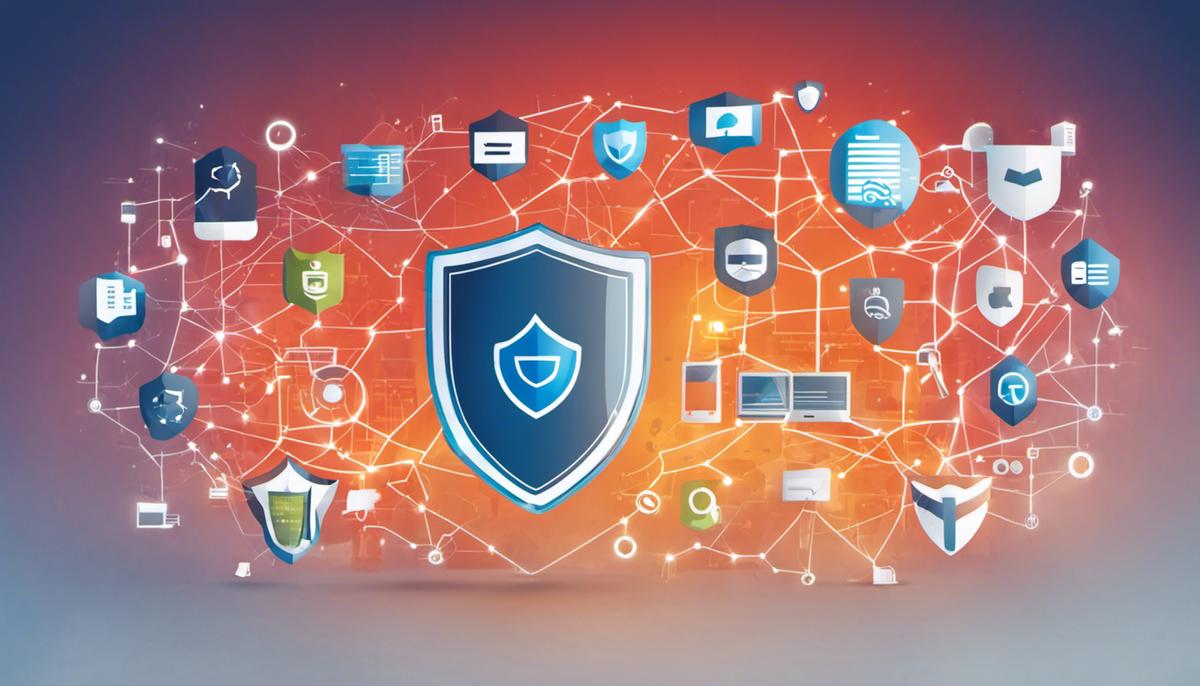How to get a job in cybersecurity? With the rise of complex and widespread digital threats, businesses are actively seeking skilled professionals to protect their digital assets. By showing interest in this field, you have taken the first step towards advancing your career. This guide is a comprehensive resource that will help you understand the fundamentals of cybersecurity, identify valuable certifications, and explore the significance of practical experience in your pursuit of a cybersecurity job.
Understanding Cybersecurity Basics
Essential Cybersecurity Concepts Every Tech Enthusiast Needs to Grasp
Leading the charge in the era of digital transformation, cybersecurity stands as an indispensable cornerstone of tech management. Here are some critical concepts in cybersecurity that tech enthusiasts can’t overlook.
Encryption: Encryption, at its core, is the coding or scrambling of information so that it can only be read by someone with the correct decoding key. This concept serves as the primary line of defense for data in transit and at rest, ensuring its integrity and safeguarding confidential information from prying eyes.
Firewall: A firewall is a virtual barrier that blocks unauthorized access to or from a private network. It forms the first line of defense in network security and can be hardware-based or software-based.
Malware: Malware encompasses viruses, worms, ransomware, and spyware. Understanding malware helps in unraveling the vast array of cyber threats posed by malicious software. It’s critical to understand how different types of malware behave to identify possible threats and mitigate their impact.
VPN: A Virtual Private Network (VPN) is a secure connection method used to add security and privacy to private and public networks. When deploying a VPN, all the online interaction is encrypted, guaranteeing a secure connection even over insecure Wi-Fi hotspots.
Authentication & Authorization: Two significant aspects of securing data and systems are ensuring that people are who they say they are (authentication) and giving them access to the correct resources (authorization). Methods like multi-factor authentication (MFA) and biometrics underpin these two concepts to prevent unauthorized system access.
Patch management: Patch management refers to the process of maintaining software updates, often to fix vulnerabilities in outdated systems and applications. This ongoing process is critical for cybersecurity to fend off cybercriminals who exploit known vulnerabilities.
Social Engineering: The art of manipulating users to give up confidential information voluntarily, typically through deceptive emails or websites, falls under Social Engineering. Recognizing these human-based tricks is an essential part of cybersecurity.
Intrusion Detection System (IDS) / Intrusion Prevention System (IPS): IDS and IPS work together to provide a sophisticated level of protection. IDS identifies potential threats, while IPS takes action to prevent them, creating a powerful network shield.
With these key cybersecurity concepts firmly in your grasp, it’s time to put them into action. Stay up-to-date on the latest innovations, engage in constant learning, and remember, the best defense in the cyber world, predominantly, is always a good offense.

How to Get a Job in Cybersecurity: Earn Relevant Certifications
Cybersecurity: A Guide to Essential Certifications for your Tech Career
A career in cybersecurity presents an ocean of possibilities, suffused with the exquisite blend of technology and problem-solving. To thrive in this field, regardless of being a neophyte or a seasoned professional, acquiring relevant certifications is just as important as learning about VPN, encryption, firewall or malware. Here’s an assessment of several crucial certifications that could be invaluable for your cybersecurity career advancement.
-
- Certified Information Systems Security Professional (CISSP)
The CISSP, issued by the International Information Systems Security Certification Consortium, is a globally recognized certification attesting to your skills in designing, implementing and managing a top-notch cybersecurity program. Beyond firewall or VPN knowledge, you must master eight domains, including security and risk management, asset security, security architecture, and network security to earn this certification.
-
- Certified Ethical Hacker (CEH)
Internet minds will relish the CEH certification. Offered by the EC-Council, this certification bridges the gap between understanding malicious hacking techniques and using these known methods ethically to identify vulnerable systems. With this certification, you become adept at understanding the hacker mindset, a pivotal tool in building robust defense mechanisms against intrusion attempts.
-
- CompTIA Security+
Emphasizing practical skills, CompTIA Security+ validates the capabilities necessary to perform core security functions. A massive step from understanding basic malware or encryption, this certification corroborates your skills in assessing the security posture of an enterprise environment and suggesting and implementing appropriate security solutions.
-
- Certified Information Security Manager (CISM)
Offered by ISACA, CISM is another globally recognized standard for management. However, unlike CISSP, it focuses primarily on the management and governance of information security. A CISM certification corroborates your expertise in developing and managing an organization’s information security program, thereby protecting against social engineering attacks and network intrusions.
-
- Certified Information Systems Auditor (CISA)
As digital transformation escalates, the need for IT Audit Control increases. CISA bridges this need, providing cybersecurity professionals with a firm grasp of IS audit processes and better understanding of how to protect information systems.
-
- Offensive Security Certified Professional (OSCP)
The OSCP is a golden standard of cybersecurity certifications for those interested in penetration testing roles. This certification requires aspirants to successfully exploit and infiltrate various simulated systems within a controlled environment. Successful candidates prove they can think creatively and persist in solving complex problems, traits necessary for cybersecurity professionals.
Sure, understanding the nuts and bolts of cybersecurity, including malware, firewall, encryption, and VPN, is paramount. Still, amplifying your knowledge by acquiring these pertinent certifications could sky-rocket your career in cybersecurity and place you a cut above your peers. Whether combating social engineering attacks, employing intrusion detection systems, or managing patch updates, these certifications ensure you’re better prepared for the cyber threats of tomorrow.

How to Get a Job in Cybersecurity: Gain Practical Experience
Heading into the bustling terrain of cybersecurity, the question frequently emerges: How essential is practical experience in carving out a successful cybersecurity career?
The response, while multi-fold, weaves an intriguing narrative around the vital force of hands-on experience. It’s no secret that the terrain of cybersecurity is continually evolving, with new threats emerging daily and existing threats growing more complex. This highlights the imperative need for practical experience within the sector.
While theoretical knowledge forms the foundation, it simply is the starting point. The application of theoretical understanding is made possible through hands-on exposure. A direct encounter with real-world scenarios presents an unfiltered picture of the cybersecurity landscape, granting the ability to strategize and troubleshoot effectively.
Practical experience is what bridges the gap between theoretical knowledge and real-world application. Experienced professionals can swiftly perceive an anomaly, identify potential threats, and implement immediate solutions. This level of proficiency becomes crucial when dealing with sensitive data breaches or urgent security incidents, where timely response may prevent considerable losses.
A quintessential aspect of this industry is staying up-to-date with constantly evolving threats. Security vulnerabilities are increasingly sophisticated, demanding analysts to remain at the forefront. Practical experience actively engages one with cutting-edge tools and techniques. Fostering a mindset of continuous learning and experimentation significantly aids in staying current and adaptable.
Furthermore, practical experience embodies a diverse spectrum of situations that textbooks seldom cover. Skills such as crisis management, critical thinking, and communication, honed through real-life experiences, align well with the unpredictable nature of the cybersecurity domain.
Bear in mind that hands-on experience in cybersecurity shouldn’t be mistaken merely for technical skills. It’s also about developing an understanding of business operations, risk management, and regulatory compliance – aspects not usually covered in certifications.
However, it’s also important to acknowledge that practical experience doesn’t devalue the importance of cybersecurity certifications. Industry-standard certifications, such as CISSP, CEH, CompTIA Security+, CISM, CISA, and OSCP, remain pivotal in substantiating one’s theoretical competence and dedication to the field.
In conclusion, the importance of practical experience in cybersecurity cannot be overstressed. It’s experiential learning that polishes raw technical knowledge into refined expertise. It’s about embracing a dynamic environment, understanding business processes, superior problem-solving, and resilience – elements that shape a capable cybersecurity professional. Undoubtedly, a combination of theoretical knowledge supplemented by hands-on experience should be viewed as the winning formula for strides in a cybersecurity career.

The journey towards becoming an accomplished cybersecurity professional is definitely a challenging one. However, with a sturdy foundation in cybersecurity principles, the right certifications, and a commitment to gaining practical experience, you can position yourself as a highly desirable candidate. The cybersecurity landscape presents rich opportunities for growth and equipped with the insights provided in this guide, you now have the tools to navigate and excel in it. Here’s to your success in your cybersecurity career: the world needs more dedicated and knowledgeable defenders like you.
